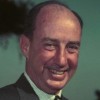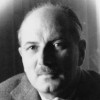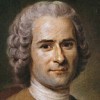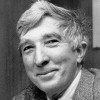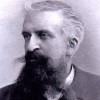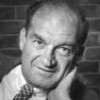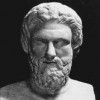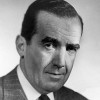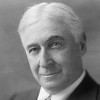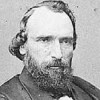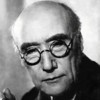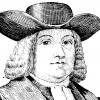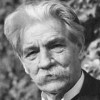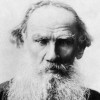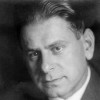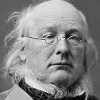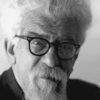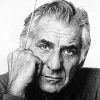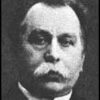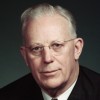We are happy in this world just in proporshun as we make others happy.
[We are happy in this world just in proportion as we make others happy.]
My dear fellow citizens,
For forty years you heard from my predecessors on this day different variations on the same theme: how our country was flourishing, how many million tons of steel we produced, how happy we all were, how we trusted our government, and what bright perspectives were unfolding in front of us.
I assume you did not propose me for this office so that I, too, would lie to you.
If it be of the highest importance to man, as an individual, that his religion should be true, the case of society is not the same. Society has no future life to hope for or to fear; and provided the citizens profess a religion, the peculiar tenets of that religion are of very little importance to its interests.
Alexis de Tocqueville (1805-1859) French writer, diplomat, politician
Democracy in America, Vol. 1, ch. 17 (1835)
Alt. trans.: "Though it is very important for man as an individual that his religion should be true, that is not the case for society. Society has nothing to fear or hope from another life; what is most important for it is not that all citizens profess the true religion but that they should profess religion."
Be very careful never to show your own bias to anyone who is giving you information, or passing it on to you. Once he sees that you have a particular inclination he will instinctively tend to tell you what he thinks will suit you, and enhance your opinion of him.
When you have reached your own room, be kind to those who have chosen different doors and to those who are still in the hall. If they are wrong they need your prayers all the more; and if they are your enemies, then you are under orders to pray for them.
The day may dawn when fair play, love for one’s fellow men, respect for justice and freedom, will enable tormented generations to march forth triumphant from the hideous epoch in which we have to dwell. Meanwhile, never flinch, never weary, never despair.
Would yee both eat your cake, and have your cake?
John Heywood (1497?-1580?) English playwright and epigrammist
Proverbes, Part 2, ch. 9 (1546)
(Source)
Do not meddle in the affairs of wizards, for they are subtle and quick to anger.
J.R.R. Tolkien (1892-1973) English writer, fabulist, philologist, academic [John Ronald Reuel Tolkien]
The Lord of the Rings, Vol. 1: The Fellowship of the Ring, Book 1, ch. 3 “Three Is Company” [Gildor, to Frodo] (1954)
(Source)
The moment of truth, the sudden emergence of a new insight, is an act of intuition. Such intuitions give the appearance of miraculous flashes, or short-circuits of reasoning. In fact they may be likened to an immersed chain, of which only the beginning and ends are visible above the surface of consciousness. The diver vanishes at one end of the chain and comes up at the other end, guided by invisible links.
The masses have never thirsted after truth. They turn aside from evidence that is not to their taste, preferring to deify error, if error seduce them. Whoever can supply them with illusions is easily their master; whoever attempts to destroy their illusions is always their victim.
I concur with you strictly in your opinion of the comparative merits of atheism and demonism, and really see nothing but the latter in the being worshipped by many who think themselves Christians.
Thomas Jefferson (1743-1826) American political philosopher, polymath, statesman, US President (1801-09)
Letter to Richard Price (8 Jan 1789)
(Source)
Price had written to Jefferson on 26 Oct 1788 about the harm done by religion and wrote "Would not Society be better without Such religions? Is Atheism less pernicious than Demonism?"
Character assassination is at once easier and surer than physical assault; and it involves far less risk for the assassin. It leaves him free to commit the same deed over and over again, and may, indeed, win him the honors of a hero in the country of his victims.
LEADER OF THE CHORUS: Weak mortals, chained to the earth, creatures of clay as frail as the foliage of the woods, you unfortunate race, whose life is but darkness, as unreal as a shadow, the illusion of a dream.
Aristophanes (c. 450-c. 388 BC) Athenian comedic playwright
The Birds, ll. 685-687 (414 BC) [tr. O’Neill (1938)]Full text.
Alt. trans.: Frere (1839) (text): "CHORUS (LEADER): Ye Children of Man! whose life is a span, / Protracted with sorrow from day to day, / Naked and featherless, feeble and querulous, / Sickly, calamitous creatures of clay!"
Alt. trans.: Hickie (1853) (text): "CHORUS (LEADER): Come now, ye men, in nature darkling, like to the race of leaves, of little might, figures of clay, shadowy feeble tribes, wingless creatures of a day, miserable mortals, dream-like men."
When the natural Weakness and Imperfection of Human Understanding is considered, with the unavoidable Influences of Education, Custom, Books and Company, upon our Ways of thinking, I imagine a Man must have a good deal of Vanity who believes, and a good deal of Boldness who affirms, that all the Doctrines he holds, are true; and all he rejects, are false. And perhaps the same may be justly said of every Sect, Church and Society of men when they assume to themselves that Infallibility which they deny to the Popes and Councils.
Benjamin Franklin (1706-1790) American statesman, scientist, philosopher, aphorist
Letter to Abiah Franklin (father) (13 Apr 1738)
Full text.
An appeaser is one who feeds a crocodile, hoping it will eat him last.
Winston Churchill (1874-1965) British statesman and author
(Attributed)
Churchill reportedly used used this phrase frequently prior to WWII, but it has not been found per se by Churchill scholars in his writings, speeches, press conferences, radio addresses, or parliamentary debates.
However, on a radio broadcast (20 Jan 1940), speaking of the neutral states standing by while Germany (and Russia) swallowed them up (referencing Finland fighting against Russia in particular), "Each one hopes that if he feeds the crocodile enough, the crocodile will eat him last. All of them hope that the storm will pass before their turn comes to be devoured. But I fear -- I fear greatly -- the storm will not pass. It will rage and it will roar, even more loudly, even more widely."
Also attributed to Franklin Roosevelt.
More discussion of this quotation: An Appeaser Is One Who Feeds a Crocodile, Hoping It Will Eat Him Last – Quote Investigator.
I have an old-fashioned belief that Americans like to make up their own minds on the basis of all available information. The conclusions you draw are your own affair. I have no desire to influence them, and shall leave such efforts to those who have more confidence in their own judgment than I have in mine.
Those who matter don’t mind, and those who mind don’t matter.
Bernard Baruch (1870-1965) American businessman and statesman
(Attributed)
When asked by Igor Cassini, society columnist for the New York Journal American, how he handled the seating arrangements at all his dinner parties, Baruch responded, "I never bother about that. Those who matter don't mind, and those who mind don't matter."Quoted in Bennett Cerf, Shake Well Before Using: A New Collection of Impressions and Anecdotes Mostly Humorous (1948).
The more ignorant men are, the more convinced are they that their little parish and their little chapel is an apex to which civilization and philosophy has painfully struggled up the pyramid of time from a desert of savagery.
Some people have no original ideas because they do not think well enough of themselves to consider their ideas worth noticing and developing.
It’s not the load that breaks you down, it’s the way you carry it.
Lena Horne (1917-2010) American singer, actress, dancer, activist
(Attributed)
The bill for establishing religious freedom, the principles of which had, to a certain degree, been enacted before, I had drawn in all the latitude of reason and right. It still met with opposition; but, with some mutilations in the preamble, it was finally passed; and a singular proposition proved that its protection of opinion was meant to be universal.
Where the preamble declares, that coercion is a departure from the plan of the holy author of our religion, an amendment was proposed by inserting “Jesus Christ,” so that it would read “A departure from the plan of Jesus Christ, the holy author of our religion;” the insertion was rejected by the great majority, in proof that they meant to comprehend, within the mantle of its protection, the Jew and the Gentile, the Christian and Mohammedan, the Hindoo, and Infidel of every denomination.
Thought that is silenced is always rebellious. Majorities, of course, are often mistaken. This is why the silencing of minorities is necessarily dangerous. Criticism and dissent are the indispensable antidote to major delusions.
DICAEPOLIS: Comedy too can sometimes discern what is right. I shall not please, but I shall say what is true.
Aristophanes (c. 450-c. 388 BC) Athenian comedic playwright
Acharnians, li. 500-501 (425 BC) [tr. Athen. (1912)]
Full text.
The neer to the church, the further from God.
John Heywood (1497?-1580?) English playwright and epigrammist
Proverbes, Part 1, ch. 9 (1546)
(Source)
To the question whether I am a pessimist or an optimist, I answer that my knowledge is pessimistic, but my willing and hoping are optimistic.
Albert Schweitzer (1875-1965) Alsatian philosopher, physician, philanthropist, polymath
Out of My Life and Thought, An Autobiography, Epilogue (1933) [tr. Campion]
See also Gramsci.
When [ignorance] does not know something, it says that what it does not know is stupid.
Leo Tolstoy (1828-1910) Russian novelist and moral philosopher
A Confession, ch. 7 (1882) [tr. Maude (1921)]
Full text.
‘What a pity that Bilbo did not stab that vile creature, when he had a chance!’
‘Pity? It was Pity that stayed his hand. Pity, and Mercy: not to strike without need. And he has been well rewarded, Frodo. Be sure that he took so little hurt from the evil, and escaped in the end, because he began his ownership of the Ring so. With Pity.’
J.R.R. Tolkien (1892-1973) English writer, fabulist, philologist, academic [John Ronald Reuel Tolkien]
The Lord of the Rings, Vol. 1: The Fellowship of the Ring, Book 1, ch. 2 “The Shadow of the Past” [Bilbo and Gandalf] (1954)
(Source)
The important thing in life is not the victory but the contest; the essential thing is not to have won but to have fought well.
[L’important dans la vie ce n’est point le triomphe, mais le combat, l’essentiel ce n’est pas d’avoir vaincu mais de s’être bien battu.]
Pierre Frédy, Baron de Coubertin (1863-1937) French pedagogue, historian, founder of the International Olympic Committee
Olympic Creed, Speech, Olympic Games, London (24 Jul 1908)
Alt. trans: "The important thing in life is not the triumph but the struggle, the essential thing is not to have conquered but to have fought well."
Original phrasing by de Coubertin: "The importance of these Olympiads is not so much to win as to take part."
De Coubertin was drawing from a sermon by Bp. Ethelbert Talbot at St Paul's Cathedral, London (19 Jul 1908): "We have just been contemplating the great Olympic Games. What does it mean? It means that young men of robust physical life have come from all parts of the world. It does mean, I think, as someone has said, that this era of internationalism as seen in the Stadium has an element of danger. Of course, it is very true, as he says, that each athlete strives not only for the sake of sport, but for the sake of his country. Thus a new rivalry is invented. If England be beaten on the river, or America outdistanced on the racing path, or that American has lost the strength which she once possessed. Well, what of it? The only safety after all lies in the lesson of the real Olympia -- that the Games themselves are better than the race and the prize. St. Paul tells us how insignificant is the prize, Our prize is not corruptible, but incorruptible, and though only one may wear the laurel wreath, all may share the equal joy of the contest. All encouragement, therefore, be given to the exhilarating -- I might also say soul-saving -- interest that comes in active and fair and clean athletic sports."
The development from a religion of fear to moral religion is a great step in peoples’ lives. And yet, that primitive religions are based entirely on fear and the religions of civilized peoples purely on morality is a prejudice against which we must be on our guard. The truth is that all religions are a varying blend of both types, with this differentiation: that on the higher levels of social life the religion of morality predominates.
Albert Einstein (1879-1955) German-American physicist
“Religion and Science,” New York Times Magazine (9 Nov 1930)
(Source)
We probably differ on that which relates to the dogmas of theology, the foundation of all sectarianism, and on which no two sects dream alike; for if they did they would then be of the same. you say you are a Calvinist. I am not. I am of a sect by myself, as far as I know.
Thomas Jefferson (1743-1826) American political philosopher, polymath, statesman, US President (1801-09)
Letter (1819-06-25) to Ezra Stiles Ely
(Source)
What we need and what we want is to moralize politics, and not to politicize morals.
Sir Karl Popper (1902-1994) Austrian-British philosopher
The Open Society and Its Enemies, ch. 6 (1945)
Full text.
For the trouble with lying and deceiving is that their efficiency depends entirely upon a clear notion of the truth that the liar and deceiver wishes to hide. In this sense, truth, even if it does not prevail in public, possesses an ineradicable primacy over all falsehoods.
Hannah Arendt (1906-1975) German-American philosopher, political theorist
“Lying in Politics,” Crises of the Republic (1969)
(Source)
I’m a pessimist because of intelligence, but an optimist because of will.
Antonio Gramsci (1891-1937) Italian writer, politician, Marxist political theorist
Letter from Prison (19 Dec 1929)
Also attributed to Romain Rolland.
The only lost cause is one we give up on before we enter the struggle.
Václav Havel (1936-2011) Czech playwright, essayist, dissident, politician
(Attributed)
Quoted in Amnesty International, "From Prisoner to President – A Tribute" (Oct 2003).
The illusion that times that were are better than those that are, has probably pervaded all ages.
Horace Greeley (1881-1872) American newspaper editor, reformer, politician
The American Conflict: a history of the great rebellion in the United States, ch. 1 “Our Country After the Revolution” (1864)
Full text.
Every method is used to prove to men that in given political, economic, and social situations they are bound to be happy and those who are unhappy are mad or criminals or monsters.
Alberto Moravia (1907-1990) Italian novelist [b. Alberto Pincherle]
“Man As an End” (1964) [tr. Wall (1965)]
All men who read escape from something else into what lies behind the printed page; the quality of the dream may be argued, but its release has become a functional necessity. All men must escape at times from the deadly rhythm of their private thoughts. … I hold no particular brief for the detective story as the ideal escape. I merely say that all reading for pleasure is escape, whether it be Greek, mathematics, astronomy, Benedetto Croce, or The Diary of the Forgotten Man. To say otherwise is to be an intellectual snob, and a juvenile at the art of living.
Love me, love my dog.
John Heywood (1497?-1580?) English playwright and epigrammist
Proverbes, Part 2, ch. 9 (1546)
(Source)
Earlier noted as a common proverb by Bernard of Clairvaux in the 11th Century: "Qui me amat, amet et canem meum [Who loves me will love my dog also] in his First Sermon on the Feast of St Michael.
Ignorance is not a simple lack of knowledge but an active aversion to knowledge, the refusal to know, issuing from cowardice, pride or laziness of mind.
Three Rings for the Elven-kings under the sky,
Seven for the Dwarf-lords in their halls of stone,
Nine for Mortal Men doomed to die,
One for the Dark Lord on his dark throne
In the Land of Mordor where the Shadows lie.
One Ring to rule them all, One Ring to find them,
One Ring to bring them all and in the darkness bind them
In the Land of Mordor where the Shadows lie.J.R.R. Tolkien (1892-1973) English writer, fabulist, philologist, academic [John Ronald Reuel Tolkien]
The Lord of the Rings, Vol. 1: The Fellowship of the Ring, Book 1, ch. 2 “The Shadow of the Past” (1954)
(Source)
Gandalf recites this verse "long known in Elven-lore," after finding lines 6-7 engraved in Quenya (but representing the Black Speech) on the ring Frodo has.
We are ready to die for an opinion but not for a fact: indeed, it is by our readiness to die that we try to prove the factualness of our opinion.
The twentieth century looms before us big with the fate of many nations. If we stand idly by, if we seek merely swollen, slothful ease and ignoble peace, if we shrink from the hard contests where men must win at hazard of their lives and at the risk of all they hold dear, then the bolder and stronger peoples will pass us by, and will win for themselves the domination of the world.
Theodore Roosevelt (1858-1919) American politician, statesman, conservationist, writer, US President (1901-1909)
“The Strenuous Life,” speech, Hamilton Club, Chicago (10 Apr 1899)
Full text.
Happy the Man, and happy he alone,
He who can call today his own:
He who, secure within, can say,
Tomorrow do thy worst, for I have lived today.
Be fair or foul or rain or shine
The joys I have possessed, in spite of fate, are mine.
Not Heav’n it self upon the past has pow’r,
But what has been, has been, and I have had my hour.
[Ille potens sui
laetusque deget cui licet in diem
dixisse “Vixi: cras vel atra
nube polum pater occupato
vel sole puro; non tamen inritum
quodcumque retro est efficiet neque
diffinget infectumque reddet
quod fugiens semel hora vexit.”]Horace (65-8 BC) Roman poet and satirist [Quintus Horacius Flaccus]
Odes [Carmina], Book 3, # 29, l. 41ff (3.29.41-48) (23 BC) [tr. Dryden (1685)]
(Source)
"To Maecenas." (Source (Latin)). Alternate translations:He's Master of himself alone,
He lives, that makes each day his own:
He lives that can distinctly say
It is enough, for I have liv'd to day:
Let Jove to morrow smiling rise,
Or let dark Clouds spread o're the Skys:
He cannot make the pleasures void
Nor sower the sweets I have enjoy'd,
Nor call that back which winged hours have born away.
[tr. Creech (1684)]Happy he,
Self-centred, who each night can say,
“My life is lived: the morn may see
A clouded or a sunny day:
That rests with Jove: but what is gone,
He will not, cannot turn to nought;
Nor cancel, as a thing undone,
What once the flying hour has brought.
[tr. Conington (1872)]That man is master of himself and shall live happy, who has it in his power to say, "I have lived to-day: to-morrow let the Sire invest the heaven, either with a black cloud, or with clear sunshine; nevertheless he shall not render ineffectual what is past, nor undo or annihilate what the fleeting hour has once carried off.
[tr. Smart/Buckley (1853)]Lord of himself that man will be,
And happy in his life alway.
Who still at eve can say with free
Contented soul, "I've lived to-day!
Let Jove to-morrow, if he will,
With blackest clouds the welkin fill,
Or flood it all with sunlight pure.
Yet from the past he cannot take
Its influence, for that is sure.
Nor can he mar, or bootless make
Whate'er of rapture and delight
The hours have borne us in their flight."
[tr. Martin (1864)]Happy indeed is he,
Lord of himself, to whom
’Tis given to say, as each day ends, “I have lived:”
To-morrow let the Sire invest the heaven
With darkest cloud or “purest ray serene,”
He mars not what has been,
Nor from Time's sum blots out one fleeted hour.
[tr. Bulwer-Lytton (1870)]That man will live in happiness and self-command who can say at the close of each day, "I have lived. To-morrow let the Great Father fill the sky with black cloud or bright sunshine, yet can he not make void that which is to come, nor cause that not to have been which the flying hour hath once carried away on its wings."
[tr. Elgood (1893)]Self-ruled, light-hearted shall he be,
Who daily 'I have lived,' can say,
Dark tempests let the Sire decree,
Or brightness, for the coming day.
Yet cannot he the bygone days
Unmake, or hold the past undone,
Nor can with utmost might erase
The work of hours whose glass is run.
[tr. Gladstone (1894)]He will, his soul possessing, live joyfully,
Who, as each day goes by, can say, "I have liv'd;
To-morrow let th' Almighty Father
Either fill up with the darkling storm-cloud,
Or the pure sunlight! That which is past, e'en He
Cannot undo and cause to have never been,
Nor can He by his pow'r demolish
Bliss that the past fleeting hour has given."
[tr. Phelps (1897)]That man will be
Master of self, and pass in joy, who daily may
Declare "I have lived*: to-morrow let the Father
Encompass heaven, or with black cloud,
Or sunshine clear: still that which is behind
He will not render void nor forge anew
Nor make as though undone,
Whate'er the flying hour has once removed.
[tr. Garnsey (1907)]Self-centred he,
And blest, who can make boast each coming night
"This day I've lived." Or dark or bright
To-morrow's dawn may be,
As Jove shall please. But never deed that's done
Can ev'n high Heaven make as 'twere thing of naught;
Or act, by Time to issue brought,
Cancel as though 'twere none.
[tr. Marshall (1908)]Master of himself and joyful will that man live who day by day can say: "I have lived to-day ; to-morrow let the Father fill the heaven with murky clouds, or radiant sunshine! Yet will he not render vain whatever now is past, nor will he alter and undo what once the fleeting hour has brought.
[tr. Bennett (Loeb) (1912)]Lord of himself, and happy, will
He be, who can from day to day
Say, "I have lived; let Jove fulfill
Tomorrow's sky with leaden-grey
Clouds or with shine, he can't undo
What has been done, nor make as naught,
No, nor reforge and shape anew,
What once the flying hour has brought.
[tr. Mills (1924)]Call him happy
And lord of his own soul who every evening
Can say, "Today I have lived.
Tomorrow Jove may blot the sky with cloud
Or fill it with pure sunshine, yet he cannot
Devalue what has once been held as precious,
Or tarnish nor melt back
The gold the visiting hour has left behind."
[tr. Michie (1963)]A man is his own
Master, is happy, Maecenas, saluting
The sun and saying “Today I’ve been
Alive.” The gods can let tomorrow’s
Sky glow or be black with clouds,
But tomorrow's tomorrow, I've got what I've got,
Nothing I've had in my hands will be nothing,
Though time takes it.
[tr. Raffel (1983)]Happy the man who has earned the right to say:
"I've lived my life. There may be storms tomorrow,
Maybe fair weather. Nobody knows for sure.
What I have had in the past cannot be taken
Away from me now."
[tr. Ferry (1997)]Master of himself and joyful
will that man live who is able
every day to say: "I have lived."
Tomorrow let the Father fill the sky
either with dark clouds or radiant sunshine.
But even he cannot undo that which is done
or render vain the past
or alter what the fleeting hour has once wrought.
[tr. Alexander (1999)]He’s happy, he’s his own master, who can say
each day: ‘I’ve lived: tomorrow, the Father may
fill the heavens with darkening cloud,
or fill the sky with radiant sunshine:
yet he can’t render whatever is past as
null and void, he can never seek to alter,
or return and undo, whatever
the fleeting moment tosses behind it.
[tr. Kline (2015)]
Indecision has rendered all my faculties barren.
Henri-Frédéric Amiel (1821-1881) Swiss philosopher, poet, critic
Journal (14 Oct 1872) [tr. Ward (1887)]
Full text.
What are all the records of history, but narratives of successive villainies, of treasons and usurpations, massacres and wars?
Samuel Johnson (1709-1784) English writer, lexicographer, critic
The Rambler, #175 (19 Nov 1751)
(Source)
The chief reason warfare is still with us is neither a secret death wish of the human species, nor an irrepressible instinct of aggression, nor, finally and more plausibly, the serious economic and social dangers inherent in disarmament, but the simple fact that no substitute for this final arbiter in international affairs has yet appeared on the political scene.
The most important thing a man can know is that, as he approaches his own door, someone on the other side is listening for the sound of his footsteps.
Clark Gable (1901-1960) American film actor [b. William Clark Goebel]
(Attributed)
In Ronald Reagan, Where's the Rest of Me?, ch. 18 (1965). Quoted as something Reagan wrote to his first son, Michael, before his marriage.Alternately given as, "There is no greater happiness for a man than approaching a door at the end of the day knowing someone on the other side of the door is waiting for the sound of his footsteps," in Julia Baumgold, "Ronald Reagan's Total Woman," New York Magazine, 28 Jul 1980.
At one time kings were anointed by Deity, so the problem was to see to it that Deity chose the right candidate. In this age the myth is “the will of the people” … but the problem changes only superficially.
Useful undertakings which require sustained attention and vigorous precision in order to succeed often end up by being abandoned, for, in America, as elsewhere, the people move forward by sudden impulses and short-lived efforts.
What this country needs is a short, victorious war to stem the tide of revolution.
Vyacheslav von Pléhve (1846-1904) Russian Tsarist security director, Interior Minister [Vyacheslav Konstantinovich von Plehve, or Pleve; Вячесла́в Константи́нович фон Пле́ве]
Comment (1903) [tr. Walder (1974)]
(Source)
Regarding the impending Russo-Japanese War (1904-05). Possibly apocryphal; the comment is quoted in the memoirs of Count Sergei Witte, an opponent of Plehve, several years later (and well after Plehve's 1904 assassination). Witte recounted it as a retort by Plehve to General Alexey Nikolayevich Kuropatkin, who accused Plehve of supporting the conflict for adventurist/expansionist reasons.
Russia, though considered much stronger than Japan militarily, ended up losing the war, destabilizing the government and ironically leading to revolutions in 1905 and 1917.
Alternate translations:
- "We need a little victorious war to stem the tide of revolution." [tr. Yarmolinsky (1921)]
- "We need a little, victorious war to stem the revolution." [tr. Harcave (1990)]
- "To contain the revolution, we need a short victorious war." [tr Hodson (2017)]
HENRY: A speaker is but a prater, a rhyme is but a ballad, a good leg will fall, a straight back will stoop, a black beard will turn white, a curled pate will grow bald, a fair face will wither, a full eye will wax hollow, but a good heart, Kate, is the sun and the moon, or rather the sun and not the moon, for it shines bright and never changes but keeps his course truly. If thou would have such a one, take me.
As for “literature of expression” and “literature of escape” — this is critics’ jargon, a use of abstract words as if they had absolute meanings. Everything written with vitality expresses that vitality: there are no dull subjects, only dull minds.
When the skie falth we shall have Larkes.
[When the sky falls, we shall have larks.]
John Heywood (1497?-1580?) English playwright and epigrammist
Proverbes, Part 1, ch. 4 (1546)
(Source)
Administrivia: Doing the Numbers: 3/2011
We last updated the numbers back in April 2010, but since I’m thinking about it, here’s where we are now.
I moved a few other things from “Miscellaneous” into authored categories, but the overall quotations made a very nice increase over the last year (if I’d waited until the end of April, I’d be a full thousand more quotes). I’ve also added a good number of new authors.
Speaking of authors, here’s the current Top 10 (expanded a bit, due to ties). The ones in italics have jumped into the list since last year.
There’s now a listing in the sidebar (“Prolific Authors”) to show this info dynamically.
The current Top Quotes (by views) are always shown in the sidebar, too (“Popular Quotables”). As a snapshot, and with author:
- ↑ Robert Frost: “The Lesson for Today,” A Witness Tree (1942) (888)
- ↑ Michel de Montaigne: “That to Philosophize Is to Learn to Die,” Essays (1588) [tr. D. Frame (1958)] (760)
- ↑ John Steinbeck: Nobel prize acceptance speech (10 Dec 1962) (728)
- ↓ Seneca the Younger: Moral Essays, “On Tranquility of Mind De Tranquillitate Animi“, 17.10 [tr. W. Langsdorf (1900)] (702)
- ♥ Bertrand Russell: “The Triumph of Stupidity” (10 May 1933) (667)
- ↓ Theodore Roosevelt: “The New Nationalism,” speech, Osawatomie, Kansas (31 Aug 1910) (655)
- ♥ Aeschylus: Agamemnon, l. 179 (597)
- ♥ Albert Einstein: “Science, Philosophy and Religion: a Symposium” (1941) (505)
- ↓ Nathaniel Hawthorne: The Scarlet Letter, “Introduction: The Custom-House” (1850) (463)
- ↓ Lord Chesterfield: Letter to his son (9 Oct 1746) (415)
I’ve noted where each quote has risen or fallen in the rankings, or is new in the Top 10 from last time (♥). Quotes that fell off were Robert Louis Stevenson (“Aes Triplex” (1878)), William Henley (“Invictus” (1875)), and Patrick Henry (Speech, Virginia Ratifying Convention (5 Jun 1788)).
As far as traffic goes, according to Google Analytics I averaged about 107 visits a day in the last month, which looks to be up from the previous period, averaging around a thousand page views a week. Not too shabby — hardly fortune and glory, but a nice validation for my hobby.
There is no belief, however grotesque and even villainous, that cannot be made a part of human nature if it is inculcated in childhood and not contradicted in the child’s hearing.
George Bernard Shaw (1856-1950) British playwright and critic
The Intelligent Woman’s Guide to Socialism, Capitalism, Sovietism and Fascism, ch. 18 (1928)
See Schopenhauer.
There is more in you of good than you know, child of the kindly West. Some courage and some wisdom, blended in measure. If more of us valued food and cheer and song above hoarded gold, it would be a merrier world.
J.R.R. Tolkien (1892-1973) English writer, fabulist, philologist, academic [John Ronald Reuel Tolkien]
The Hobbit, ch. 18 “The Return Journey” [Thorin] (1937)
(Source)
Our doubts about ourselves cannot be banished except by working at that which is the one and only thing we know we ought to do. Other people’s assertions cannot silence the howling dirge within us. It is our talents rusting unused within us that secrete the poison of self-doubt into our bloodstream.






